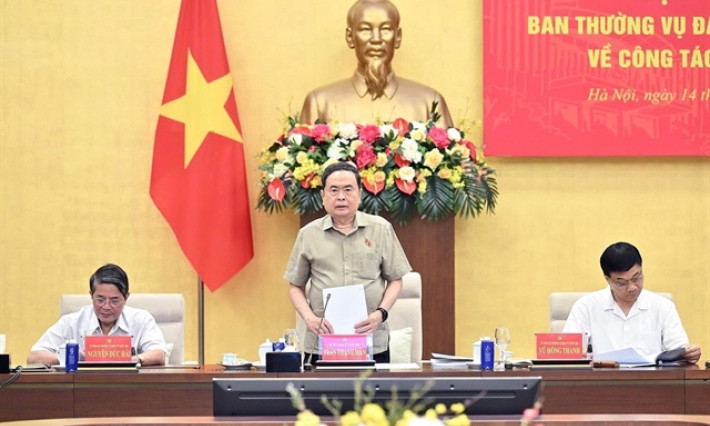State budget revenue collection accelerated
According to the General Department of Taxation, it is forecast that in the last months of 2023, the world and region will continue to face many greater difficulties and challenges, with many potentially unstable factors.
Although the State budget revenue situation in the first months of 2023 still meets the estimate, it cannot be ruled out that domestic revenue in 2023 may decrease, compared to the calculated estimate, creating pressure on the implementation of budget collection tasks for the tax industry in 2023.
To carry out the task of State budget collection, tax authorities at all levels need to continue to focus on drastically implementing the proposed key tasks and solutions.
Accordingly, there are 7 tax tasks in the last 6 months of the year, in which it is necessary to focus all resources on drastically and synchronously conducting all measures for revenue management, tax debt recovery, and prevention of budget loss, towards completing the State budget collection task in 2023.
The entire sector continues to research, advise and propose tax solutions and policies under the economic recovery and development programme. At the same time, tax authorities at all levels focus on timely and effective implementation of solutions on tax extension, exemption and reduction, and land rent that have been issued to support taxpayers, contributing to helping taxpayers quickly recover production and business, towards creating momentum for economic development and nurturing revenue sources.
The authorities continue to implement the programme of developing and perfecting institutions and legal policies on tax management and tax policy, as well as the expansion of the tax base; promoting electronicisation and digitisation of tax administration; strengthening measures to prevent electronic invoice fraud; conducting tax management for e-commerce and business activities on digital platforms; accelerate the provision of electronic tax services; develop the application of information technology to improve tax management efficiency.
Among the implementation solutions, regarding budget collection and tax collection management, the entire tax sector continues to carry out solutions to strengthen revenue management, closely monitor the progress of budget collection, evaluate and analyse each collection area, and make a plan to promptly direct and manage the monthly collection and forecast monthly and annual revenue, which are close to the actual situation.
Especially for the 18 localities with revenues regulated by the central budget and revenues belonging to the central budget, the tax sector proposes advice to the General Department of Tax, the Ministry of Finance and the Government in managing State budget revenues and central budget revenue, towards striving to complete the task of domestic revenue and central budget revenue in 2023, at the highest level, as well as helping the Government and the Ministry of Finance be proactive in operating and balancing the State budget in 2023.
The sector will also review all revenue sources generated in each area, tax law and revenues, to drastically implement appropriate tax management solutions, striving to complete the State budget collection task in 2023.
The exploitation of increased revenues from potential revenue sources (such as business on digital platforms, e-commerce, real estate transfer, chain business, house rental, and mineral resources) should be promoted to promptly propose policy solutions and effective revenue management, recommend to the People's Committee to continue to maintain and strengthen the activities of the Steering Committee to prevent revenue loss, collect tax arrears and direct the local sectors and levels to coordinate closely with tax authorities in revenue management and prevention of budget loss. The development of budget revenue estimates for 2024 and expected revenues for the 2024-2026 period will be deployed.
The propaganda of new tax policies and performance results of the entire sector will continue to be promoted through mass media channels. The communication methods will be innovated according to the trend of modern information access, helping taxpayers clearly understand and easily apply tax policies and carry out tax refund procedures. At the same time, solutions should be carried out to improve efficiency quality and support for each subject on the system of 479 information channels to support taxpayers (eTax).
The tax sector will continue maintaining and enhancing the relationships and coordinate activities with other departments, agencies, communication departments and press agencies; improve the quality and efficiency of the dialogue with enterprises; enhance the organisation of online support sessions through the websites of the General Department and departments of tax.
The inspection and supervision of taxpayers' tax declarations, especially the declarations, potentially risky business areas and businesses that enjoy policies related to tax extension, exemption and reduction, will be strengthened.
The tax agencies promote post-tax refund inspection, combined with tax settlement inspection and examination to promptly detect and handle violations by taxpayers.
The application of information technology in the management of value-added tax (VAT) refunds will continue to be promoted, focusing on the steps of classifying tax refund documents according to risk, and analysing risks of electronic invoice data for value-added tax refund management. In addition, the application of information technology will be completed to provide maximum support for the tax authority's value-added tax refund settlement, according to the newly issued Process 679.






